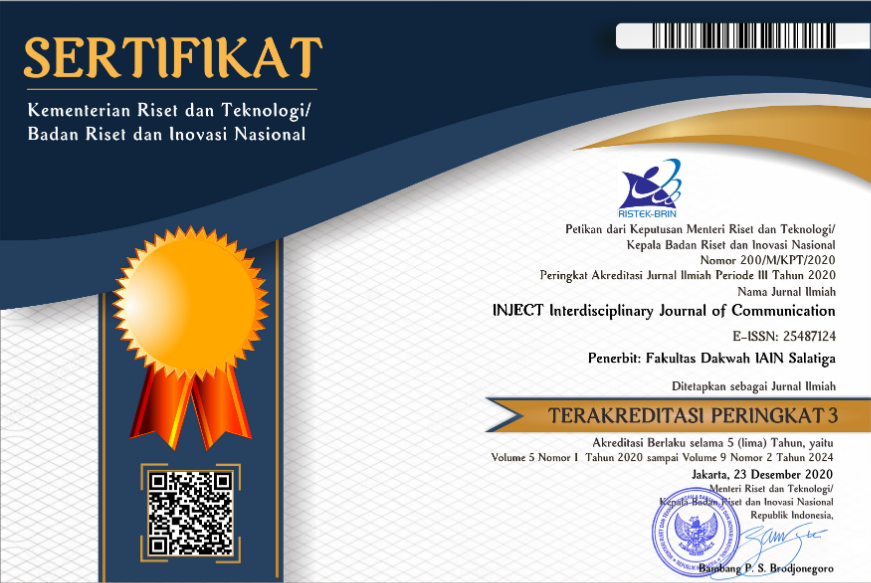Media in the Midst of Religion Moderation
Abstract
Media is an important tool to deliver an information for the public. Communication technology contributes greatly to the dissemination of information in the community. On behalf of freedom of information and democracy, all types of information are scattered in a wide society. It even tends to lose its control. Many ideas carried along with the dissemination of information. Among the ideas that exist are about radicalism and extremism in religion. The wild ideas that developed in the midst of this society pushed the government to rebuild religious thought. Religious moderation is an idea raised by the government to minimize radicalism and extremism. Then how should media regulation be carried out? And how should the media carry out its role within the framework of developing religious moderation? This study was conducted with a normative approach. Standards on how the media should be run and managed become the dominant perspective in this study. Of course, this is intended so that this study cannot be separated from the system applied in democratic politics and existing information. The issue of the role of the media in the midst of democracy and the idea of religious moderation can be explained as follows. First, the needs of information for the society in the era of democracy are pushing to bring more and more widespread information dissemination to a wide audience. This point places the media as an important institution in society. The strategic position of information media in the midst of democratic nature requires the government to be able to formulate media regulations appropriately. So that the media can carry out its role appropriately, namely as a pillar of democracy. Second, Islam is a universal religion that carries the values of humanism and rationalism. For this reason, media professionals must understand Islam's teachings well so that they are not trapped in the spread of information that provokes the emergence of extremism. In the next turn, media practitioners are also expected to be able to respond well to various existing problems, so as to be able to take frames appropriately, neutrally, and educatively, so as not to cause extremism in the community. Furthermore, the idea of religious moderation must also be disseminated by utilizing the media. Whatever the media. So that the idea of religious moderation can be spread, accepted, and carried out by the widest possible audience.
Keywords
Full Text:
PDFReferences
Akhmadi. Agus, Moderasi Beragama Dalam Keragaman Indonesia (Religious Moderation in Indonesia’s Diversity), Jurnal Diklat Keagamaan, Vol. 13, no. 2, Pebruari - Maret 2019.
Anwar. Fatmawati & Haq. Islamul, Religious Moderation Campaign Through Social Media at Multicultural Communities, Kurioritas; Media Komunikasi Sosial dan Keagamaan, Volume 12, No. 2 Desember 2019.
Arifin. Syamsul, Populisme, Demokratisasi, Mutikulturalisme, Malang, Intrans Publishing, 2019.
Aziz. Moh. Ali, Ilmu Dakwah, Jakarta, Prenada Media, 2004.
Badan Litbang Agama, Tafsir al-Qur’an Tematik, Jakarta, Kamil Pustaka, 2014.
Baran. Stanley J. & Davis. Dennis K, Teori Komunikasi Massa: Dasar, Pergolakan, dan Masa Depan, Terj. Afrianto Daud dan Putri Iva Izzati, Jakarta, Salemba Humanika, 2010.
Damas. Taufiq, dkk. Al-Qur’an: Tafsir Per-Kata, Jakarta, Suara Agung, 2013.
Effendy. Onong Ochjana, Komunikasi; Teori dan Praktik, Bandung, Remaja Rosdakarya, 2003.
Fahri. Mohamad & Zainuri. Ahmad, Moderasi Beragama, Intizar, Vol. 25, No.2 Desember 2019.
Fahrurrozi & Thohri. Muhammad, Media Dan Dakwah Moderasi: Melacak Peran Strategis Dalam Menyebarkan Faham Moderasi, Nahdlatul Wathan On-Line; Tasamuh, Volume 17, No. 1, Desember 2019
Haekal. Muhammad Husain, Sejarah Hidup Muhammad, Terj. Ali Audah, Jakarta, Litera Antar Nusa, 1992.
Heryanto. Gun Gun, Hoax dan Krisis Nalar Publik: Potret Perang Informasi di Media Sosial, dalam buku Melawan Hoax di Media Sosial dan Media Massa, Yogyakarta, Trustmedia Publishing, 2017.
Iffan. Ahmad, Ridho. Muhammad, dan Saiin. Asrizal, Konseptualisasi Moderasi Beragama Sebagai Langkah Preventif Terhadap Penanganan Radikalisme Di Indonesia, Perada: Jurnal Studi Islam Kawasan Melayu, Volume 3 Nomor 2, Juli-Desember 2020.
Ishaq. Ropingi el, Pengantar Ilmu Dakwah; Studi Komprehensif dari Teori ke Praktik, Malang, Madani Press, 2016.
Ismail. Ilyas & Hotman. Prio, Filsafat Dakwah Islam; Rekayasa Membangun Agama dan Peradaban, Jakarta, Kencana Prenada Media Group, 2011.
Khanata. Tim, Demasifikasi Pemerintahan; Perspektif Marzuki Usman, Yogyakarta, Jendela, 2004.
Rachman. Budhy Munawar (ed), Membela Kebebasan Beragama; Percakapan tentang Sekularisme, Liberalisme, dan Pluralisme, edisi digital, Jakarta, Democracy Project, 2011.
Severin. Werner J. & Tankard, Jr. James W., Teori Komunikasi; Sejarah, Metode, dan Terapan di Dalam Media Massa, Terj. Sugeng Hariyanto, Jakarta, Kencana, 2005.
Shihab. M. Quraish, Lentera al-Qur’an; Kisah dan Hikmah Kehidupan, Bandung, Mizan, 2013.
Shihab. M. Quraish, Wasathiyah, Wawasan Islam tentang Moderasi Beragama, Tangerang, Lentera Hati, 2019.
Wibowo. Ari, Kampanye Moderasi Beragama di Facebook: Bentuk dan Strategi Pesan, Edugama, Vol. 5 No. 1 Desember 2019.
DOI: https://doi.org/10.18326/inject.v6i1.41-56
Refbacks
- There are currently no refbacks.
Copyright (c) 2021 Ropingi El Ishaq

This work is licensed under a Creative Commons Attribution 4.0 International License.








